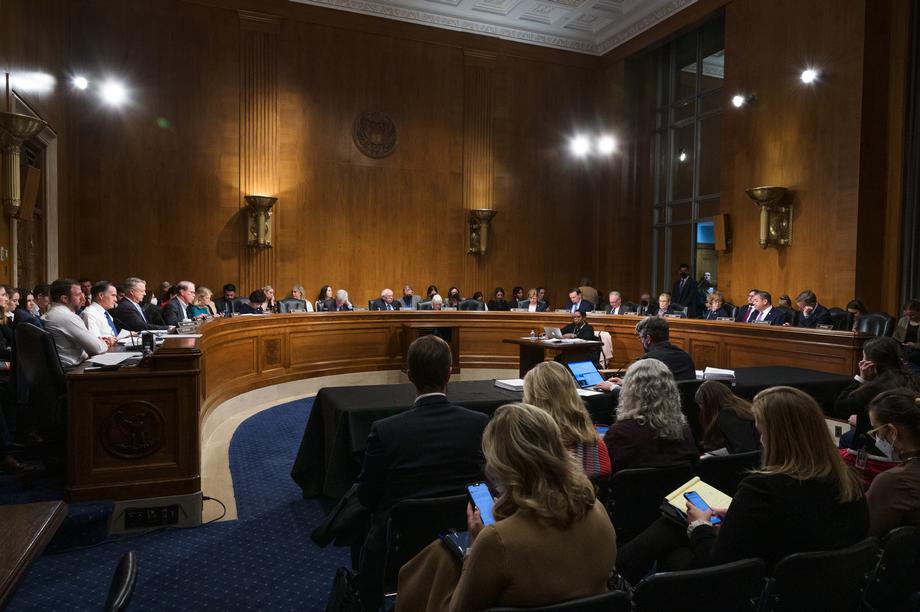OPIOID LEGISLATION PASSES THROUGH SENATE HELP COMMITTEE

On December 12, 2023, the Senate Committee on Health, Education, Labor & Pensions (HELP) held a markup on the SUPPORT Act and the Modernizing Opioid Treatment Access Act. The SUPPORT Act reauthorizes numerous laws aimed at implementing programs and services for those struggling with and overcoming substance use, while the Modernizing Opioid Treatment Access Act allows pharmacies to dispense methadone.
The SUPPORT Act
The SUPPORT Act, S. 3393, reauthorizes programs and grants that support prevention, treatment, and recovery from opioid use from Fiscal Year (FY) 2024 to FY 2028.
The Act prioritizes prevention by authorizing:
- $2.5 billion for grants that aid states in data collection to monitor the administration of prescription drugs.
- $280 million for grants through the First Responder Training Program to train first responders on how to respond to a suspected drug overdose.
- $309 million for the National Child Traumatic Stress Initiative, which focuses on the prevention of long-term consequences of child trauma, early intervention services, and treatment of child trauma.
- $35 million for a grant to support States, territories, Indian Tribes or Tribal organizations, and local governments in carrying out public health activities to prevent or reduce adverse childhood experiences. The Act also provides funds to enhance overdose data collection and analysis.
- Data collection on prenatal substance misuse.
- The use of funds for tests capable of detecting the presence of substances, like fentanyl.
The Act prioritizes treatment by authorizing:
- $195 million for programs that provide treatment in residential settings to pregnant and postpartum women with substance use disorders.
- $250 million is authorized to fund a 6-year loan repayment program for substance use disorder treatment professionals and $305 million for mental health professional training programs.
- Grants that fund trauma support and mental health services through schools to prevent and mitigate trauma that children and youth experience.
- At the department level, the Act directs the Attorney General, in consultation with the Secretary of HHS, to issue final regulations within one year of enactment for prescribing controlled substances over telemedicine.
- At the agency level, the Act directs the Substance Abuse and Mental Health Services Administration (SAMHSA) to review state uses of funding for activities to identify and address early serious mental illness, including First Episode Psychosis, under the Community Mental Health Services Block Grant and publish a report and related guidance. Also, SAMHSA, the National Institute of Mental Health, and Centers for Medicare and Medicaid Services (CMS) shall issue joint guidance to states on how to best coordinate care for individuals with serious mental illness or serious emotional disturbances.
The Act prioritizes recovery by authorizing:
- $70 million for a grant to prevent, provide recovery support for, and treat substance use disorders in children, adolescents, and young adults.
- The Act also authorizes grants to establish or operate comprehensive opioid recovery centers, which provide wrap-around treatment and recovery support services,
- The Act authorizes $80 million for community organizations that provide long-term recovery support services and $60 million for substance use disorder treatment programs that help individuals in recovery re-enter the workforce.
- At the agency level, the Act Codifies the Office of Recovery at SAMHSA and requires a report to Congress on the activities of the Office.
The SUPPORT Act received a number of amendments aimed at, in relevant part, increasing youth prevention and recovery, requiring the Food and Drug Administration (FDA) to publish a plan on how it reviews opioid analgesic drugs and authorize the assistant secretary of HHS for mental health and substance use to establish a pilot program for eligible groups to receive grants related to preventing and reducing the risk of suicide and drug overdoses by children, adolescents and young adults.
The Modernizing Opioid Treatment Access Act
The Modernizing Opioid Treatment Access Act, S. 644, expands access to methadone by allowing certain providers to electronically prescribe methadone for opioid use disorder (OUD) and for pharmacies to dispense it for that purpose. The Act also allows relevant maintenance or detoxification treatment to be provided through telehealth. Sen. Markey introduced the bill in March to address the fact that 80% of counties do not have opioid treatment facilities, which is where methadone is normally provided. According to the NIH, access to methadone decreases the rate of overdoses by 50%.
Conclusion
Both pieces of legislation passed through committee and have been reported to the full Senate for consideration. While getting legislation through Congress is anything but smooth sailing, these two bills saw promising bipartisan support, meaning they have a chance at landing on President Biden’s desk in the future. The House of Representatives has also presented and passed a version of the SUPPORT Act, H.R. 4531. The House passed the bill, as amended, 386-37 then referred it to the Senate. H.R. 4531 was introduced on the Senate floor and was referred to the HELP Committee on December 13, 2023.
National Indian Health Board
50 F St NW, Suite 600 | Washington, DC 20001 | Phone: 202-507-4070 | Email: [email protected]